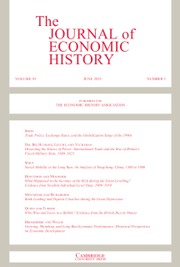作者:CAFERRO, W
摘要:This article reopens the classic debate about the relationship between the city and the countryside in medieval/Renaissance Italy. It examines city-countryside relations in Siena in the second half of the fourteenth century and compares them with what we know of Siena's northern neighbor, Florence. It argues that Sienese policy was moderate and even-handed and, despite similar pressures, less harsh than that of the Florentines. The difference is explained by the fact that Siena was economicall...
作者:University of Chicago
摘要:The gap between the mean wages of black men and white men in the United States narrowed substantially between 1940 and 1950. There was, however, almost no change in this wage gap between 1950 and 1960. Some of this discontinuity in the path of black progress can be explained by general changes in the wage structure-wage compression in the 1940s and slight expansion in the 1950s. However, most of the gains of the 1940s were driven by race-specific factors, including increasing relative wages co...
作者:CLARK, G
摘要:Before the Industrial Revolution in Britain most workers controlled their pace, timing, and conduct at work. Factory discipline radically changed this. Employers now dictated how, when, and in what manner work was done. Why did discipline triumph? Was it required by the need to tightly coordinate workers with new technologies? Or was it successful because it coerced more effort from workers than they would freely give? The empirical evidence shows that discipline succeeded mainly by increasing...
作者:National Bureau of Economic Research
摘要:This article explores wealth accumulation among European immigrants who arrived in the United States between 1840 and 1850. It uses a new sample of immigrants linked from passenger-ship records to the 1850 and 1860 federal census manuscripts. These immigrants rapidly accumulated real and personal wealth. Their real wealth grew 10 percent with each year's residence in the United States. This was not because immigrants arriving in the early 1840s were wealthier at arrival than later arrivals, no...
